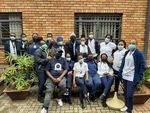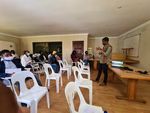VOLUME 1, ISSUE 1. APRIL 2021 - WRITTEN BY LETHU KAPUEJA
←
→
Page content transcription
If your browser does not render page correctly, please read the page content below
VOLUME 1, ISSUE 1. APRIL 2021
"IZWI LEMPILO"
A WITS HEALTH
HUBB NEWSLETTER
“FOR HE WHO HAS HEALTH HAS HOPE; AND HE WHO HAS HOPE,
HAS EVERYTHING.”
– OWEN ARTHUR
WRITTEN BY LETHU KAPUEJA
As our first Newsletter that covers almost a year of operation – This one is
quite long! Be prepared. We hope you enjoy the read and get a good sense
of what we have been up to. All our following monthly newsletters will be
much shorter but still show what amazing work our Health HUBB is doing!
The Wits Health HUBB (WHH) is a project hosted by the DSI-NRF Centre of
Excellence in Human Development at Wits University in Johannesburg.
The HUBB was conceptualized in 2018 by Dr Lisa Ware, Dr Delan Naidoo
and Mr Lethu Kapueja and begun operations in 2020 with initial seed
funding from the Development Bank of Southern Africa, program specific
funding from the Wits Health Consortium and the DSI-NRF Centre of
Excellence in Human Development at Wits, plus in-kind support from
Multiplex Partners and others..
It is an initiative that advocates for youth development and health
promotion in Soweto and is committed to addressing socio economic
barriers to health faced by young people and their respective communities.
Its vision, mission and objectives are as followsVISION
Developing health advocacy to activate youth
as agents of change for a healthier tomorrow.
MISSION
To create economic opportunity, empowering
youth professionally and personally, to build
healthier communities.
OBJECTIVES
To provide meaningful professional work
experience, training and qualification in the
healthcare space for formerly unemployed
youth.
To activate health consciousness and personal
wellbeing amongst youth health advocates
through meaningful work, health assessment
and psychosocial support.
To expand community access to healthcare
through collaboration.
. The Wits Health HUBB aims to provide
community health care through developing
youth skills in the health sector and
positioning the very same trainees in the local
community to conduct basic health checks,
refer patients to their local clinics and bring
awareness about important health and
wellness issues.
The WHH also works with local public
healthcare facilities in Soweto to extend their
reach into their local communities.At the WHH, we believe that change at the societal level starts with the individual and central to change is the learning and application of new behaviour. WHH aims to equip the youth with the crucial skills and resources they need in order to improve their lives and become agents for change. Improved health is central to development and the Wits Health HUBB believes that young people play a key role as role models for their peers and communities, for health awareness and positive health behaviours. As people who have been working closely on health research and community engagement in Soweto we are not oblivious to the many structural and socioeconomic challenges, such as unemployment and lack of education, experienced by many young South Africans and addressing these alongside health promotion is the innovative approach the HUBB delivers through its programs. Within Soweto, Wits Health HUBB operates as part of a collective of youth focused training and community development experts and we contribute as the health and wellness partner. While the physical infrastructure for the precinct at Jabulani has yet to be completed, our Health Advocates have been undertaking training at the Chris Hani Baragwanath Hospital and operating within the Soweto community, with shared partner activities at Moletsane Sports Complex (near Jabulani). The WHH reports to the Steering Committee of the DSI-NRF Centre of Excellence in Human Development through the Director of the Centre, who is an ex-officio member of the HUBB. However, we also have an esteemed group of advisors who form our Strategic Advisory Group. They are academic, private sector and government leaders with an interest and background in health programmes of a similar nature. These individuals are from the Gauteng District Health Research Committee, The Centre for Social Development in Africa, University of Johannesburg, the Strategy Economics and Finance department of the Gordon Institute of Business Sciences, Yes for Youth, the DSI-NRF Centre of Excellence in Human Development and Director of the Developmental Pathways for Health Research Unit at Wits University, the Department of Family Medicine & Primary Care, Wits University, and the Clinical Governance Initiative Wits University The eighth seat of a community stakeholder group (CSG) chair is still vacant while the CSG is being constituted.
THE HEALTH ADVOCATES NQF ACCREDITED
TRAINING PROGRAM
A group of twenty youth from Soweto
commenced the Health Advocates
learnership program on the 1st of
October 2020 and are completing
their NQF Level-3 Health Promotion
Officer qualification with our training
partner, a QCTO - and HWSETA -
accredited provider: the Kunokhanya
Training Academy (KTA). The learners
are simultaneously working as Health
Advocates in the local community
and will complete their programme
on the 31st of September 2021. At the
end of the program the learners will
obtain a Health Promotion Officer In designing the Health Advocates
Qualification, and occupational program, we interviewed a variety of
certificate with SAQA ID: 4597 training partners who were willing to
co-design a health education and
employment training program that
included theory, practical training,
workplace training as well as additional
research and health promotions
advocacy skills. KTA emerged as the
preferred accredited training college,
established in 2015 and providing a
range of health NQF courses. Our
Service Level Agreement (SLA) with
KTA was signed in September 2020
and their involvement, flexibility and
depth in understanding our
expectations has been remarkable and
pivotal to our success thus far.
The 20 learners were selected through
a rigorous recruitment process with
support from Multiplex Partners. Their
academic performance to date has
been inspiring, with an average class
mark of over 70% throughout all their
assessments.The 20 learners were selected through
a rigorous recruitment process with
support from Multiplex Partners. Their
academic performance to date has
been inspiring, with an average class
mark of over 70% throughout all their
assessments.
In keeping with a holistic view of
youth development, all program skills
and community activities designed to
contribute to capacity development of
personally beneficial to the learners
involved as well. In a recent check in
with them for example Princess
Mudau and Bonakele Majola indicate SUPERVISED HEALTH SERVICE DELIVERY
they have gained confidence and self-
Health service delivery is a critical
esteem and realize the important role
part of the training program and is
of health promotion in making
included in the four blocks of
difference in people’s lives.
community and clinical health
service delivery over the 12 month
Community work has strengthened
learnership. The first block took place
Kgomotso Mabusetsa’s interpersonal
in January 2021 and the second in
skills and taught her to be more
March 2021. The trainees have visited
disciplined, confident and to show
households in Snake Park, Diepkloof,
empathy towards the community
Pimville. Dobsonville, Orlando East,
members. Studying while earning is
Orlando West, Meadowlands and
important vital for their undivided
Zola. Over the duration these visits,
involvement in the program.
the trainees conducted blood
pressure and referred over 60
Bonolo Moshoadiba says as a 27 years
community members with high
old, she is not ignorant of the
blood pressure levels to local clinics
inequalities of access to health care
in Soweto. In March 2020 we
for marginalized groups but working
recorded visits to 1,046 households,
with them on a face to face level has
health checks conducted on 1,551
put faces to the problem and this
community members, and more
makes her a more rounded health
intensive health assessments done on
professional.
all 20 Health Advocates and 20
precinct partners and SafeHub
This program has ignited a calling for
Playmakers.The health checks have
health care and advocating for the
been conducted in collaboration with
health needs of the community and
City of Johannesburg Health
providing knowledge
Promotions Officers.RESEARCH AT THE WITS HEALTH HUBB
As a program that evolved from scientific
research conducted in Soweto, the Wits
Health HUBB has continued to contribute
to scientific outputs as well as citizen
engagement with research. As the HUBB
progresses, it continues to: identify the
needs of young people and the
community; to refine the program and
build evidence of its impact; and to inform
policy and practice while attracting
research funding.
As the young people are trained in
conducting health research and spend COMMUNITY ENGAGEMENT
time in the community, there is also an
opportunity to answer important health The health services provided by the
questions collaborating with various Health Advocates under supervision
partners including the local community. were rolled out with a variety of
Currently the team are contributing to
partners from the local health district
better understand the problem and
and community organizations. This is
management of high blood pressure in
an example of the strength of building
children as part of a national expert
partnerships that help the HUBB with
consortium, to evaluate and improve
health literacy in adults, and to assess how achieving its strategy of working and
the community perceive the health supporting the local services in the
advocates and the health support they community.
provide. In order to introduce the HUBB in the
local community, a few community
engagement events have been
successfully held rolled out. In 2020,
two sessions targeting the youth
organisations and non-profit
organisations were held. The
workshops also served as platforms to
plan on appropriate methods for
community engagement and to
discuss which youth and health
activists could represent the local
community in the WHH Community
Stakeholder Group (CSG). We are
delighted by the overwhelming
support and constructive feedback
from all who attended.Following these workshops, we attended a clinic manager’s seminar held on the 4th
of December 2020 at Lillian Ngoyi Clinic in Soweto and presented some of our work
at a Johannesburg District Health Research Committee virtual event On the 10th of
December 2020, we took to Jabulani Mall with the Community Policing Forum to
raise awareness about WHH activities in the Jabulani community. In 2021 so far we
have attended the Johannesburg Health Promotions Officer Forum in Tladi, Soweto
twice and again introduced the Wits Health HUBB to potential partners.
The precinct partners have met for two hours every Wednesday since the beginning of
November 2020 to plan and talk over efficient and appropriate ways to engage with
the communities we work in. The Wits Health HUBB is involved in these engagements
as well.
WHAT IS NEXT?
With the first cohort of Health Advocates more than half-way through their programme,
we are now making plans for the second intake in the latter half of 2021. This involves
conceptualizing the 2021 program taking lessons from the first intake. Our recruitment
process for the next trainee intake will begin in August 2021. Plans are underway for an
Inter-precinct collaboration pop-up event in May in Moletsane, Soweto where we will be
bringing awareness to blood pressure and hypertension issues in line with World
Hypertension Day on May 17th . Efforts are ongoing with the corporate sector and with
research grants to secure additional funding to increase the number of young people we
can bring directly into the programme, with each Health Advocate increasing the reach
and impact in Soweto. We are excited to co-locate to our Jabulani home with our
partners soon!
We will be in touch with another newsletter in May sharing more exciting updates on
our progress and impact. Thank you for your interest and/or valuable involvement in the
Wits Health HUBB.
Email: healthhubb.research@wits.ac.za
Website: https://www.witshealthhubb.org
Instagram: @witshealthhubb
Facebook: @WitsHHubb
Twitter: @WitsHHubbYou can also read



























































